Are you debating between multiple programming languages to learn or specialize in? Today we're going to look at an analysis created by Logan__dev on the devjobsscanner page, which I find very interesting. You’ll find the direct sources in the links.
Table of Contents
0 - Where the data comes from
The data was collected during the last 21 months by scraping websites such as LinkedIn, Glassdoor and similar sites that post job offers. Therefore, these are real job offers, not just trendy results like you might find in a StackOverflow survey, though as we’ll see, the results are very similar.
Something worth noting: for example, some listings request experience in object-oriented programming languages like C# or Java; in those cases, the offer counts toward both languages.
And while here we’ll look at a more global overview, anyone can do an analysis of what is most popular in their area, as each location can vary a bit.
1 - JavaScript and Python: The most in-demand
To no one's surprise, the most in-demand programming language right now is JavaScript/TypeScript. In fact, 30% of the analyzed job offers are for JavaScript, and of course, this also includes all JavaScript frameworks.
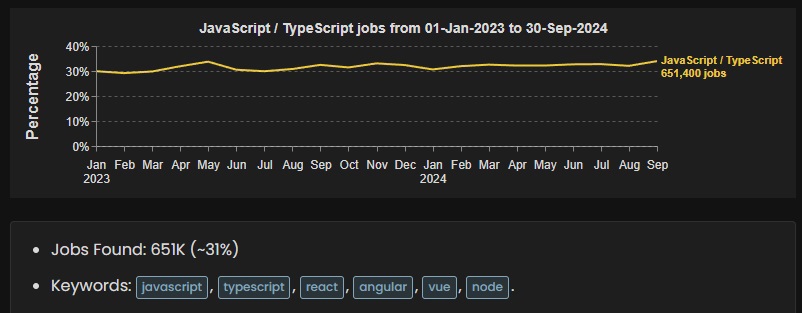
In this case, StackOverflow’s Popular Technologies comparison is similar, as long as you set the filter for professionals.
Because we’ll see that those who are learning prefer to start with another language:

The second most popular language is Python, which again surprises no one. I imagine by now you all know it’s a very popular language for data roles or scripting tasks, so it’s widely used.
The number of Python job offers was around 20%. So together, these two languages account for about 50% of developer job offers.
2 - C# and Java for Object-Oriented Programming
It’s no coincidence that Java (18%) and C# (12%) take third and fourth place, as in my experience they’re widely used in companies for several reasons.
- Their high reliability and the backing of large companies.
- With both languages you can develop desktop, web, backend or even mobile applications.
- They are leading object-oriented programming languages.
These characteristics, and the fact that the companies using them are usually fairly large, translate to a lot of demand. Why Java has 50% more demand than C# is a subject for another post.
An interesting point I hadn't noticed before is that C# gets paid more than Java despite having less demand:
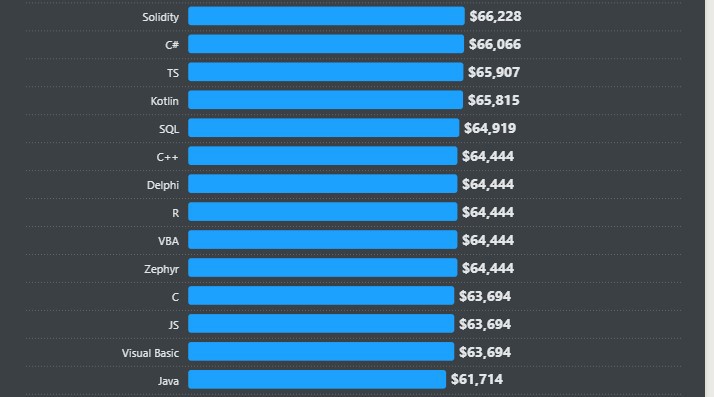
This shows the importance of supply and demand. In Spain, for example, Java is always taught, and so everyone graduating from college knows Java, but not C#. And “does not know” is in heavy quotes, since in the end they’re very similar: mostly just syntax and a few other differences.
3 - PHP Is Not Dead
Fifth place goes to a language that has supposedly been “dead” for the last 15 years, none other than PHP, with 10% of the job listings.
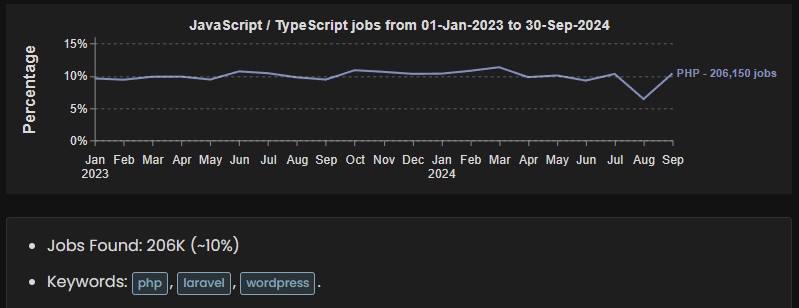
The only reason this language is treated so poorly is because most of us who have been programming for over a decade started out with PHP, and we learned from someone who was using a version that was five releases behind. But nowadays PHP is a fully capable language just like any other. While it’s true it's interpreted and therefore a bit slower than Java or C# for most applications.
If we compare it to the StackOverflow survey, PHP comes in at the eleventh position, and is one of the worst paid as well, third from the bottom:
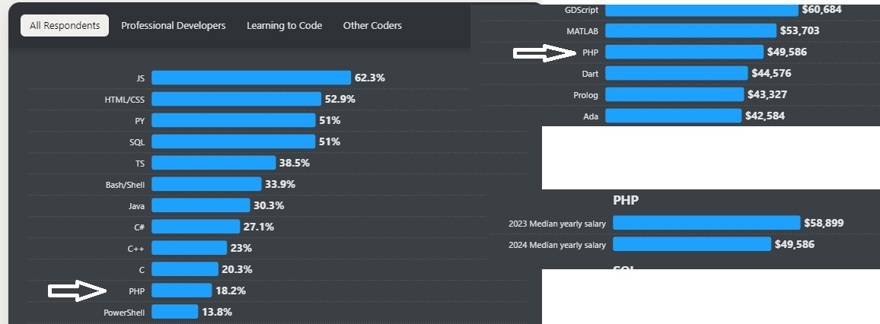
4 - The boss is still going strong
Although C/C++ are not the same language, in this analysis they are combined because the author says it was hard to distinguish them in the listings. In any case, between C and C++, they make up 8% of job offers.
That really surprises me, to be honest. I barely ever see any C or C++ job offers; clearly these languages are widely used, but 8% seems incredible to me.
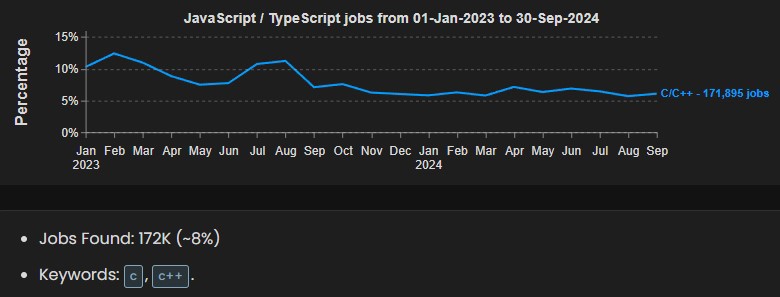
In any case, it looks like the trend has dropped compared to 2023. We’d have to see if the exception was 2023, being a year with a lot of demand, or if it’s actually this 2024 with lower demand.
5 - Learning more than one programming language can make your life much easier
It’s funny, some time ago I posted and made a video about learning more than one programming language. In that video I talked about two languages that, interestingly enough, are at the bottom of the list: Ruby (4%) and Go (2%).
Not much to add: Ruby has the advantage of a framework like Ruby on Rails, which, while extremely opinionated, is very powerful. Plus, with its way of writing code that sometimes feels like plain English, it makes Ruby very easy to adapt to and get started with. That said, Ruby used to be used mainly for writing scripts, though Python has pretty much taken that spot now.
As for Go, the only professional use I've seen for it is creating console applications or CLIs. Of course you can build web apps with it, but personally I have no other opinions to add.
Conclusion
The first thing I want to remind you is that you can find this content and more at this link.
This information is very useful, but keep in mind it’s all global data. It’s always best to check your own area's listings to know which technologies stand out where you live.
One thing to add to this analysis is salaries, which unfortunately aren’t given here, but for that you can look at StackOverflow’s analysis.

